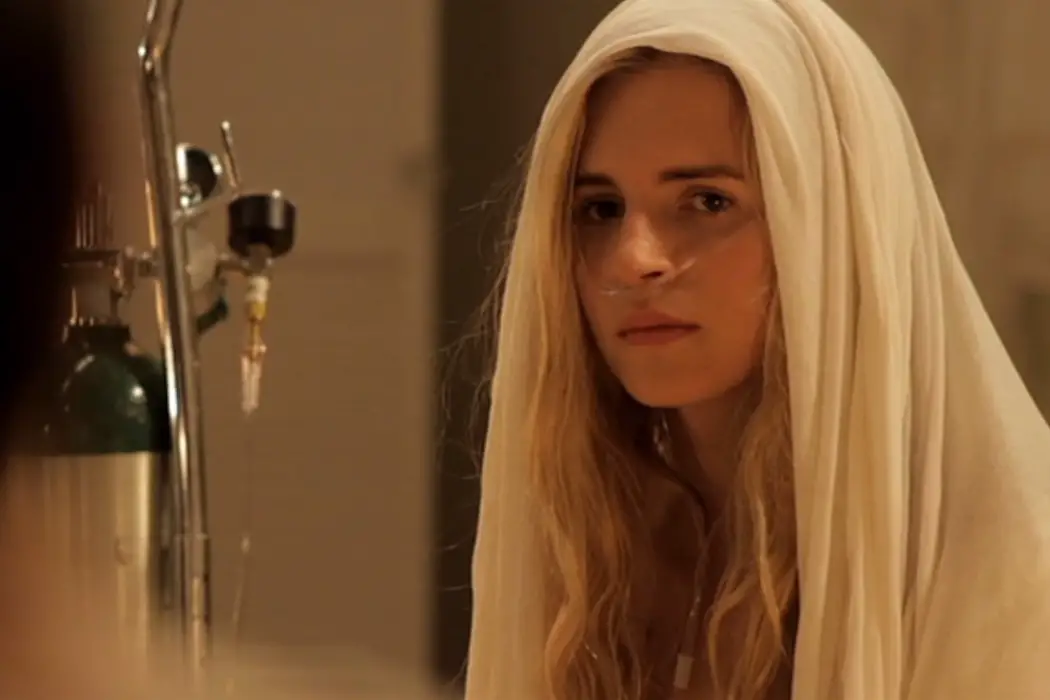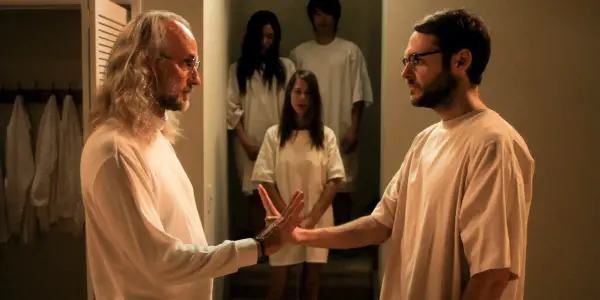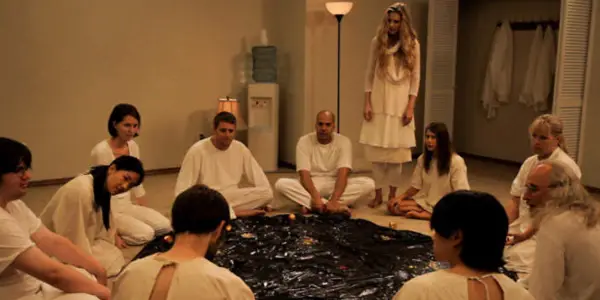SOUND OF MY VOICE: A Retrospective Look At Indie Gold

Stephanie Archer is 39 year old film fanatic living in…
For a decade, I have been fascinated by the minds of Brit Marling and Zal Batmanglij, delivering captivating films and TV series that give the mind plenty to mule over long after they have ended. My first invitation into the inner workings of their minds was back in 2011 with the critically praised film Sound of My Voice. While this was a big year in general for Brit Marling, front lining another Sundance premiere Another Earth, Sound of My Voice becomes a deeply invested viewing whose take on cults developed a cult-like allegiance for those who would follow what Marling and Batmanglij would create in the future. With the 10th anniversary this month, I found myself longing to see the film again, the tantalizing and hypnotic voice of Brit Marling‘s Maggie captivating once again, calling me to return to the sanctity of the basement and her impossible story.
What this second viewing provided was a retrospective look at the cinematic journey of these two creators, the path they have decided to follow, and the creativity that has only grown stronger since. There are clearly aspects that influenced their later crafts, specifically The OA, and a subject matter that has retained relevance even 10 years later.
“If you listen closely you might hear the sound of my voice”
The Sound of My Voice begins with our central characters arriving at the cult’s heart for the first time, their past and their journey irrelevant, their new “lives” starting at this moment. While they have been preparing for this moment of arrival, everything that was has fallen to the past. Much like cult behavior, it does not matter how you got here, it is the new life and family you are embracing that matters.

Viewers are as in the dark as Peter (Christopher Denham) and Lorna (Nicole Vicius) as they are navigated through the home, patted down for electronics, asked to bathe and be “generous with the soap”, and have their hands bound and eyes blindfolded before being driven to an undisclosed location. Finally reaching their destination, they are led into a basement, locked within, asked to open their minds and accept what they are about to receive – a future and a truth they have been specifically chosen for.
As Maggie appears, the sound of her voice cutting gently, yet intently through the silence, her influence is immediately apparent and already deeply rooted. As she slowly begins to relay her story of being a time traveler from 2054, it seems as though everyone is mystified and enamored. Yet, after leaving the orange and warm colors of the basement, reality comes back hard, the contrasting reality revealing Peter and Lorna’s true intentions of exposing Maggie as a con artist – hoping to prevent her from causing harm to her unquestioning followers.
Yet, where suspicion and lies seem to weave themselves around every word Maggie utters, paranoia and suspicion begin to creep in as well. What originally seems the beginnings of a cult and manipulation begin to warp into a questionable truth, leaving viewers with the same decision as Peter – only you can decide what you believe.
Creating a Cult
Sound of My Voice is a brilliant execution into the cult mind and its methods of induction. It is also a cleverly crafted examination of how even the seemingly strongest individuals can be broken down into accepting the supposed truths they are hearing. One of the first and most important aspects was capturing the act of normalizing each behavior presented and asked of Maggie’s accolades. From the first moments, Peter and Lorna enter the basement, a child is seen in the corner having their blood drawn. It is a strange thing to see but small, only Peter and the camera acknowledging. With little knowledge of the reason, you accept it and move on.

Both Peter and the audiences accept this small part allowing for the acceptance of more as you continue forward. From here it grows, next with just a story, then dropping your guard and allowing the vulnerability of self, then purging your body, arming and kidnapping. You can see the acceleration of cults throughout history. There is an acceleration on what is demanded and an increased normalcy that this is okay – setting a bar and asking you to push further. Sound of My Voice captures this aspect immediately, giving the entire film the breadth to grow.
The film also captures the brilliant charisma required within a leader. They do not need to be strong or loud. They can be a peaceful flower, their words the poison that slowly seeps through your veins and through your mind. Like a psychic that can read people to relay the fortunes so desperately desired to be heard, so too can a cult leader, knowing body language and the right questions to ask. They can read you better than you can of yourself, and coupled with this charisma, they are a force to be reckoned with.
Building on this, much like the normalcy of action, cult leaders have a way of shaping their intentions, making them appear to be the subject’s decision. In an intensely layered moment, Sound of My Voice cuts through the silence of the basement set, Maggie demanding Peter say aloud that he is a “weak man”, subsequently having him ask himself “why”. She puts the responsibility and accountability on Peter. He has asked the question aloud, as well as answered. And while some may debate it could be perceived as a therapeutic release of self, it is the forced trust that is manipulated from this forced accountability, a trust that can now be further manipulated and built on.
Yet, the focus of the film is not just on Maggie as a potential cult leader, but on Peter as well, giving Sound of My Voice a sense of duality and further complexity – whose voice are you hearing? Peter, whose mother fell pry to a cult and ended her life, is on a mission to expose cults and their leaders – and in this case specifically Maggie. Where you as an audience are left deciding what you believe about Maggie, the same is left to be decided about Peter.

“She is a con artist. She is dangerous. We have to expose her before all those people kill themselves.” Peter is internally torn between his inability to forgive his mother for taking her life and the abandonment he experienced in its wake. As a result, he developed an overarching need to protect others he sees as his mother – “they are weak and looking for meaning” – and a strong desire to belong somewhere. His career sees him as a substitute teacher, never fully a part of an organization and his love life has him contrasted to Lorna, who has faced her own demons and overcome them (drugs and rehab).
As he navigates through life, feeling as though no place is truly his, the sexual electricity and the luring aura of Maggie encompass the structure of leader and potential follower, ebbing and flowing with each interaction and moment of reflection. And as he begins to believe he has found a place he belongs, whether it be in the roots of his exposé or the words of Maggie, Peter becomes more paranoid, reserved, and hostile, enveloping him in his obsession and confusion of reality.

And where Sound of My Voice excels in its concepts, they would have never left the ground floor without its solid characters and the actors who portray them. Each character is crafted beautifully through the dialogue and movements of Sound of My Voice, not only being memorable but impactful. Maggie is brilliantly crafted and brilliantly executed by Brit Marling. She brings out the primal parts of humanity – acceptance and at times even a sexual electricity that is enticing and hypnotizing. Peter is quiet and determined, visually teetering a line between accolade and obsession, Christopher Denham fully encapsulating the internal struggle with a stoic face and eyes that always flicker with the flames of uncertainty.
Conclusion
While the film seems to be about Maggie and the truth of her story, it never really was about Maggie at all – it was about Peter and learning to decide what he believes – then giving in to the belief completely. It is the individuality of belief in a sea of believers because, in the end, only you can decide what is truly real.
When Sound of My Voice ends, there is a moment of “what now?” There is an ambiguity in the ending and the uncertainty of truth, leaving us to wonder if we can ever really know a person. Whether the image they are projecting is correct or a con. You don’t need to find a cult leader to understand the images projected by others, and even the ones we may project ourselves. Were they ever the person you thought they claimed to be or was it all a lie? Most times, you will never know.
Celebrating its anniversary this year, and with theaters still remaining closed in many places, now is the time to relive this classic Indie gem or to discover it for the first time.
What did you think of Sound of My Voice? Let us know in the comments below!
Does content like this matter to you?
Become a Member and support film journalism. Unlock access to all of Film Inquiry`s great articles. Join a community of like-minded readers who are passionate about cinema - get access to our private members Network, give back to independent filmmakers, and more.











